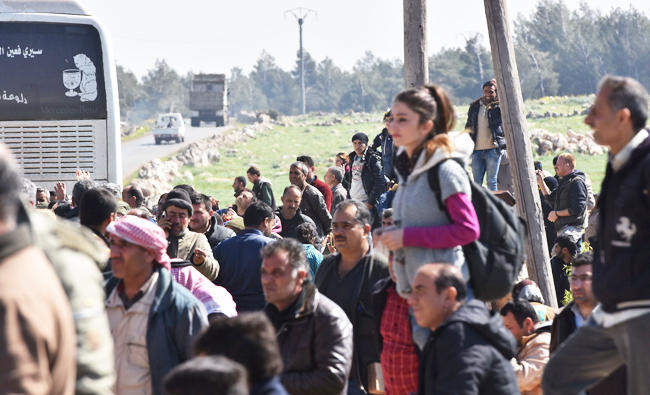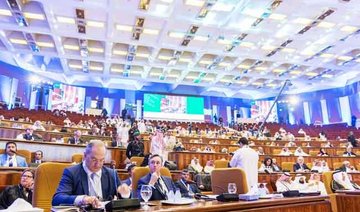ANKARA: Turkish attitudes toward the growing number of Syrian refugees living in the country have hardened, with many blaming the newcomers for job losses and a rise in terror incidents, a survey has shown.
The survey by Istanbul Bilgi University, released in Ankara on Monday, showed 71 percent of respondents blame Syrians for taking their jobs, while 58 percent believe the number of terrorist incidents in Turkey has increased because of the growing presence of Syrians.
Titled “Turkish attitudes toward Syrians in Turkey,” the study was conducted in November and December last year through face-to-face interviews with 2,004 people in four focus groups. Those surveyed were mostly supporters of the main political parties.
“In our own country now, we are second-class citizens,” a pro-Kurdish People’s Democratic Party supporter said during the survey. “They all came and settled here, they benefit from all (our) services.”
Turkey is home to 3.7 million registered refugees, most of them from Syria. Since the start of the Syrian civil war in 2011, Turkey has spent more than $30 billion on the welfare of Syrian refugees, including health, education and infrastructure. The Turkish Health Ministry also conducts vaccination campaigns and free medical checkups for those living outside the camps.
Some of these benefits given to Syrians have fueled animosity among Turkish people, with about 51 percent of those surveyed opposed to giving free medical treatment to refugees at hospitals funded by Turkish taxpayers.
The study, conducted with the support of the German Marshall Fund of the US, a think tank and grant provider, also found that 55.5 percent believe Syrians pose a health risk.
“After the Syrians arrived, the number of divorces increased,” said another respondent supporting the ruling Justice and Development Party.
However, experts say tensions will ease if more is done to integrate Syrians into Turkish society.
“We observe some increasing concerns, and distortion and displeasure among Turkish society due to the prolonged uncertainty about the stay of Syrians,” Ayselin Yildiz, UNESCO’s chair on international migration at Yasar University, told Arab News.
“But we should avoid interpreting it as rising xenophobia, which is not the case,” she said.
“I believe if the Syrians are properly integrated into the economy through a development approach, this will ease the possible tensions. Accordingly, we need a regional approach and we need local actors to be able to more actively engaged in employment strategies.”
Since 2015, the Turkish government has been working to make it easier for Syrians to obtain Turkish citizenship — a move that has sparked controversy among the Turkish public. Early last year, Syrians who were skilled white-collar professionals with a university education were given citizenship.
About 80 percent of those surveyed by the university said Syrians should not be allowed to obtain Turkish citizenship, while 86 percent said all Syrians should be sent back to their country when the war is over.
In contrast, a different survey released in November revealed that nearly 75 percent of Syrian refugees in Turkey hope to obtain citizenship, while 52 percent of Syrians want to continue living in the country.
However, according to the Bilgi University study, interactions between Turkish people and Syrian refugees have been limited. Although 69 percent meet Syrians in their neighborhoods, only 12 percent have a Syrian friend, and 5 percent visit their Syrian neighbors’ homes.
Of those surveyed, 87 percent were opposed to their daughters marrying a Syrian, while 80 percent say they cannot do business with a Syrian. Nearly three quarters, or 74 percent, refused to let their children make friends with their Syrian peers.
While some of the survey figures are worryingly high — such as negative attitudes toward giving rights to Syrians — intercommunal contact and empathy among the Turkish public are likely to overcome the apparent xenophobia, experts say.
“Living in the same neighborhood isn’t sufficient. Turks and Syrians should increase social interaction at the grassroots levels by shopping and visiting each other’s houses,” Dr. Emre Erdogan, founder and director of the Infakto Research Workshop in Istanbul, said.
For this to happen, Syrians need to obtain sufficient language skills in order to establish a dialogue with their Turkish peers, while social projects should focus on encouraging interaction, he said.
Turkish animosity toward Syrian refugees on the rise, survey warns
Turkish animosity toward Syrian refugees on the rise, survey warns

Trump says US will stop bombing Houthis after agreement struck

- “They said please don’t bomb us any more and we’re not going to attack your ships,” Trump said
- There was no immediate response from the Houthis
WASHINGTON: President Donald Trump said on Tuesday that the US will stop bombing the Houthis in Yemen after the Iran-aligned group agreed to stop interrupting important shipping lanes in the Middle East.
In an Oval Office meeting with Canadian Prime Minister Mark Carney, Trump announced the Houthis have said that they no longer want to fight but did not elaborate on the message.
“They said please don’t bomb us any more and we’re not going to attack your ships,” Trump said.
There was no immediate response from the Houthis.
The Houthis have been firing at Israel and at shipping in the Red Sea since Israel began its military offensive against Hamas in Gaza after the Palestinian militant group’s deadly attack on Israel on October 7, 2023.
The US president said Washington will take the Houthis’ word that they would not be blowing up ships any longer.
Tensions have been high since the Gaza war began, but have risen further since a Houthi missile landed near Israel’s Ben Gurion Airport on Sunday, prompting Israeli airstrikes on Yemen’s Hodeidah port on Monday.
The Israeli military carried out an airstrike on Yemen’s main airport in Sanaa on Tuesday, its second attack in two days on the Houthis after a surge in tensions between the group and Israel.
The bodies of a Belgian mother and her son were recovered in southern Jordan after flash flooding

- The mother and children had been part of a group of 18 tourists
- Fourteen tourists, all Czechs, were rescued on Sunday
AMMAN: Search and rescue teams recovered the bodies of a Belgian mother and her son on Monday in Jordan, police said a day after the woman and her three children were reported missing in flash flooding. The other two children were found alive.
Sunday’s flooding in southern Jordan also led to the evacuation of hundreds of tourists from the Petra archaeological site, the country’s main tourist attraction.
The mother and children had been part of a group of 18 tourists who had been on an adventure trip in Wadi Al-Nakhil when they were caught up in the flash flood, Ma’an district local governor Hassan Al-Jabour told state media broadcaster Al-Mamlaka TV.
Fourteen tourists, all Czechs, were rescued on Sunday. Rescue crews located two of the children alive late Sunday, Al-Jabour said. The search and rescue operation was suspended at about 2 a.m. because of the complicated weather conditions and terrain. The bodies of the woman and her son were found Monday morning after the search resumed, he said.
Further details about the family and the ages of the children weren’t immediately available.
Jordan often experiences flash flooding as heavy seasonal rains send torrents of water through dry desert valleys. At least three people died in 2021 when floodwaters swept away their car, while more than 30 people in the Dead Sea region and other parts of Jordan were killed in flash flooding in 2018.
UAE president stresses regional peace during meeting with Turkish foreign minister

- Leaders examined the strategic relationship between Ankara and Abu Dhabi
LONDON: UAE President Sheikh Mohamed bin Zayed Al-Nahyan met with Turkish Foreign Minister Hakan Fidan at the Qasr Al-Shati palace in Abu Dhabi on Tuesday.
They examined the strategic relationship between Ankara and Abu Dhabi, seeking ways to enhance it according to their mutual interests, the Emirates News Agency reported.
Sheikh Mohamed and Fidan discussed regional and international issues, highlighting developments in the Middle East. They stressed the necessity of fostering regional peace and stability in a way that benefits all nations.
The meeting was attended by several senior officials, including Sheikh Hamdan bin Mohamed bin Zayed Al-Nahyan, the deputy chairman of the Presidential Court for Special Affairs; Sheikh Mohamed bin Hamad bin Tahnoun Al-Nahyan, the adviser to the UAE president; Ali bin Hammad Al-Shamsi, the secretary-general of the Supreme Council for National Security; and Khalifa Shaheen Al-Marar, the minister of state.
Emir of Qatar discusses ties in phone call with India PM Modi

- The leaders shared perspectives on regional and international developments of mutual concern
LONDON: The Emir of Qatar Sheikh Tamim bin Hamad Al-Thani discussed ties with Indian Prime Minister Narendra Modi during a phone call on Tuesday.
The leaders discussed ways to strengthen the relationship between Doha and New Delhi. They also shared perspectives on regional and international developments of mutual concern, according to the Qatar News Agency.
Sheikh Tamim visited India last February to enhance bilateral collaboration between the two countries in areas such as trade, investment, energy, and finance.
UN urges probe into 'disturbing' video of abducted Libyan MP

- UNSMIL said it was “alarmed” by Ibrahim el-Dirsi’s “enforced disappearance”
- It described circulating images of his detention as “disturbing“
TRIPOLI: The UN mission in Libya on Tuesday called for an independent investigation into images of an abducted member of the country’s eastern-based parliament that showed signs of torture.
In a statement, UNSMIL said it was “alarmed” by Ibrahim el-Dirsi’s “enforced disappearance” and described circulating images of his detention as “disturbing.”
Dirsi, a member of the Libyan house of representatives, was kidnapped in May 2024 in Benghazi, Libya’s second largest city which he represents.
The North African country has been mired in unrest since the 2011 NATO-backed uprising that toppled dictator Muammar Qaddafi.
It remains split between the UN-recognized Government of National Unity (GNU) in Tripoli, and a rival eastern administration backed by military strongman Khalifa Haftar.
On Monday, Libya’s Al-Ahrar TV aired photos and a video showing Dirsi, apparently in a prison cell, wearing only shorts and chained with a padlock around his neck.
UNSMIL said it had asked UN digital forensic experts to verify the footage’s authenticity.
Tripoli’s GNU described the conditions in the images as “degrading, shocking and inhumane.”
It criticized the “so-called General Command,” referring to Haftar’s forces, after the video appeared to show Dirsi pleading for forgiveness.
The pro-Haftar Al-Masar TV channel quoted lawmakers as saying the images were “fabricated” and “produced using artificial intelligence.”
The eastern-based interior ministry blamed “unidentified criminals affiliated with a gang,” saying the case was under “thorough investigation.”
UNSMIL also condemned “widespread and systemic abuses in detention facilities by law enforcement and security actors in Benghazi, Tripoli, Sabha, and other locations across Libya.”
It said “arbitrary detentions, abductions, torture, enforced disappearances and deaths in custody are serious human rights violations and may constitute international crimes that can be prosecuted by the International Criminal Court.”
“Libyan authorities must ensure these practices immediately cease and that perpetrators are brought to justice,” the statement added.
In 2019, Siham Sergewa, another representative in Benghazi, was abducted from her home shortly after criticizing Haftar on television. She remains missing.






















